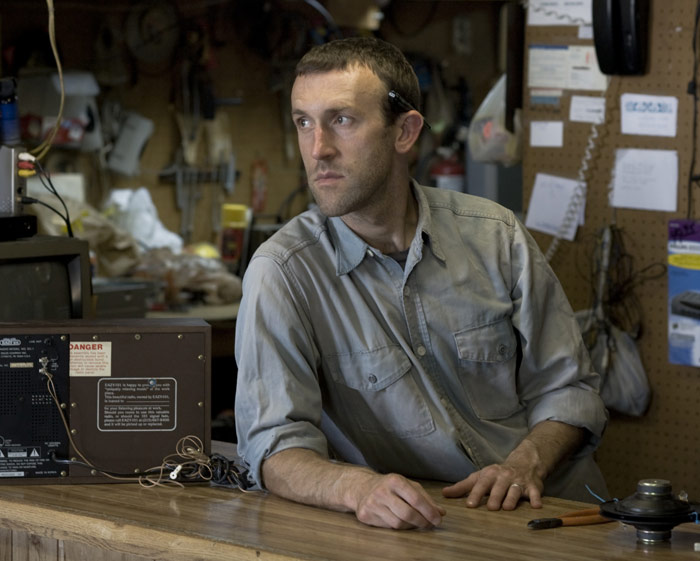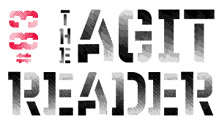
Return of the DJ
by Matt Slaybaugh
RJD2’s had an incredible journey over the past decade. After emerging from Columbus, Ohio’s hip-hop scene around the turn of the century and signing on as Definitive Jux’s resident beat junkie, he released a widely acclaimed debut of visceral, mostly instrumental hip-hop, Dead Ringer, in 2002. At the same time, he teamed up with Bustown MC Blueprint as Soul Position to put out an EP, Unlimited, and then the full-length instant classic 8 Million Stories in 2003. Dead Ringer’s only slightly lesser successor, Since We Last Spoke, saw release the following year. These records coincided with a couple of years as indie hip-hop’s producer du jour, when RJ’s beats were showcased on high profile tracks from rhymers like Mos Def, Diverse, Aesop Rock, and Copywrite. Then, seemingly tiring of hip-hop, he shocked the world by (gasp) singing on The Third Hand, his 2007 album which also saw him part ways with Def Jux.
Now the Philadelphia (he moved there before Dead Ringer’s release) producer is back, reincarnated as the mogul of his own label, RJ’s Electrical Connections, on which he’s reissued his first two records as well as dropped a new album. That record, The Colossus, is a beautiful mutt. It veers from big-beat instrumentals (“Giant Squid”) of the kind that first brought him fame to slick Steve Wonder–inspired soul (“Crumbs Off the Table”) to an actual posse cut (“A Son’s Cycle”). There are also several esoteric pop hybrids, which once again feature the man born Ramble John Krohn’s actual voice.
I caught up with RJ during a short break between rehearsals and the beginning of his tour behind The Colossus. On that particular morning, RJ’s online fans were treated to the debut of a new video for “Let There Be Horns.”
Nice video on Pitchfork today.
RJD2: Thanks, I’m really excited about it. I didn’t really have the means of envisioning it, so we went through a lot of ideas and treatments, and I just trusted the guy who directed it, Thom Glunt, to make it work.
You’re having a big month, and it looks like 2010 will be a great year for you. Do you feel like you’ve “made it?”
RJD2: I feel like I’m at a good place with my career. I think of “making it” like you’ve achieved a huge milestone like winning a Grammy or making a zillion dollars. So in that sense, I haven’t made it. But I’m happy in the sense that I’m not going to have a boss.
Does that make it easier?
RJD2: I realized at some point that I was going to do whatever I wanted, so I’m completely out on my own. In that sense, I have more responsibility and more pressure on me. But I just know that this is a much more sustainable and, frankly, lucrative way to go about things.
Does running the business ever get in the way of the art?
RJD2: The thing about the business versus art thing, it’s harder in terms of there being more work to be done. Usually I’m pretty good at balancing that, but the label is turning out to be an enormous amount of work. I’m working on hiring people and delegating some of that out now. It’s easier from a philosophical standpoint, because there are so many conversations you don’t need to have. On a label, there are weeks of conversations about what should go on the cover, whether you want to do a single or an EP. When it’s just you, you don’t even have to have that. It’s an interior dialogue, and you realize what you want to do and you just move ahead on that.
I hear you’re working on a book about espresso joints across the country. What’s the best coffee place in Philly?
RJD2: There's a place called Spruce Street Espresso downtown. The book’s just my side project on the road. It’s really tongue-in-cheek, but I do like making pilgrimages when I go places. I think it’s ridiculous, but I’ve done these little coffee missions in almost every major city in America.
What about espresso in Columbus?
RJD2: Cafe Brioso.
What’s the best place to hear good hip-hop in Philly?
RJD2: I don’t know. I never go out. I go to maybe three shows a year. It’s not that I’m not into it, but that’s my day job. When you’re flipping burgers at Burger King, you don’t go eat at Wendy’s on your day off, cause you don’t want to smell burgers at all.
Let’s talk about music a bit. I read somewhere where you said that starting a song is an exploratory process.
RJD2: A lot of people, in their head, it’s like an image. They have a blueprint or an outline and they’re trying to fill the structure and live up to the blueprint. My experience of music has never been like that. My experience is more like walking into a craft shop and whatever you may find—maybe it’s a nine-volt battery on the shelf and there’s some cloth—and it’s about how you can take these elements and make something out of them. I’m not working on a blueprint. I may have a vague idea, like the last song was slow, let’s do something fast. As the elements come together, that’s how the song turns out.
Do you have collaborators who are able to work that way?
RJD2: When I work with Blueprint, it works the same way. The difficult part of collaboration comes in when we have a difference of opinion of what we’re setting out to do. It’s not a conflict, but it’s like a decision tree, and the difficult part of it is at any of those forks in the road, when opinions differ, and mitigating that. That’s not prohibitively difficult, but it can be hard. It’s just part of the experience.
How much musical training do you have? You went to music school in Columbus, right?
RJD2: I went to the Fort Hayes musical program. I was in bands when I was younger, and then I left that program when I discovered the local hip-hop scene. I loved the charisma of the whole thing. It was a totally different vibe. There were these open mics and DJ battles and this completely different thing.
What made it so exciting?
RJD2: The differences couldn’t have been more stark. The school was a sterile environment, with 17 and 18 year olds already thinking about how to make money, already planning how to have a career. There was an element of defeatism in musical school. They were spiritually dead. The antithesis of that is what hip-hop felt like. It was at those events when I knew that traditional music education wasn’t going to work for me. So when I realized I wasn’t good enough to be in the top five or ten percent, that I wasn't going to be a great jazz musician at the age of 23, I dropped out of the music program.
You’ve talked before about how you got sick of hip-hop and rap records that were made in the mail. Was this record done all in person?
RJD2: All the instrumentation that I hired out was done here in my studio. One of the vocals was done here, but actually all the other vocals were done in the mail. All the songs I wrote and then demoed—I sent them demoed versions with vocals. So I sent them the demo and instrumental version and said check it out and go for it. But it wasn’t that writing back and forth thing. I’ve realized that when I said that before, I don’t think I was being as accurate as I could have been. And actually, right now, I’d rather do it in the mail. I’m not great at being “creative” when people are around me. I can really cut loose when I’m alone. When I’m around people, in the process, I don’t have the same devil may care attitude as when I’m in the studio by myself.
But that still doesn’t sound like the kind of thing you were complaining about before.
RJD2: No. Making those kind of records, there’s a formula. You make a beat and that’s it. It’s one loop over and over. And you make a bunch of these, and then a rapper picks, and there’s not the thought or the crafting of the song. Now when I work with rappers, I’ll send them a rough draft. They send it back, and then I move things around, and we go through multiple drafts.
Wait, that’s not usually the case? Because I always picture the rapper in the booth while the producer’s cheering him on through the window and it’s just like those videos.
RJD2: That’s just not the case. I bet dollars to doughnuts, most of the guys that work on major label rap records don’t even have one conversation with the producers. Their managers maybe talk to the producers and they talk to their managers.
You’ve just shattered all my illusions.
RJD2: Sorry, man.
There's a great video of you online working on circuit boards and making your own devices. Do other producers make their own stuff like that?
RJD2: Frankly, I don’t get the impression that they do. I find that most people I know—musicians, producers—they just want things to work. They’re not concerned with the intricacies of how it works. I’ve always been fascinated with how things work. When I was young, if something was broken, I’d always take it apart. And over time, my interest in building circuits grew. It may sound corny, but there’s an aspect of drama. You spend two hours wiring up a circuit board and there’s a moment when you plug it in and it’s either going to work or not going to work. It’s exciting. However, like most things, sometimes it works and sometimes it doesn’t work.
